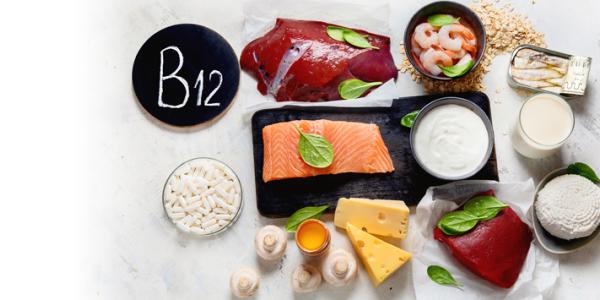
From nerve function to red blood cell formation, vitamin B12 plays an essential role in many of your body's processes. Keep reading to learn the benefits of vitamin B12 and how to ensure you're getting your daily dose.
Vitamin B12 — also known as cobalamin — is crucial for nerve tissue health, brain function and the production of red blood cells. Unlike other, more straightforward vitamins, there are a whopping eight different B vitamins:
- Thiamin (B1)
- Riboflavin (B2)
- Niacin (B3)
- Pantothenic acid (B5)
- Pyridoxine (B6)
- Biotin (B7)
- Folic acid (B9)
Last but not least, there's a group of compounds called cobalamins, which are collectively vitamin B12.
The bad news is that vitamin B12 — and the rest of the B vitamins — can't be stored by your body, which is why it's so important to stay on top of your vitamin B consumption. Vitamin B12 deficiency can lead to vitamin deficiency anemia, which is one of the many reasons that B12 is considered an essential vitamin. Let's take a look at some of the other major reasons that vitamin B12 is an essential part of healthy body function and how you can source it.
Skip
Why you need vitamin B12
- Forming healthy red blood cells
- Normal brain function
- Central nervous system function
- Producing DNA
Who is at risk of vitamin B12 deficiency?
According to the National Institutes of Health, the following groups are among those most likely to be vitamin B12 deficient:
- Older adults. Between 3% and 43% of community-dwelling older adults have vitamin B12 deficiency.
- People with pernicious anemia. This autoimmune disease affects the gastric mucosa and results in gastric atrophy, resulting in failure to produce intrinsic factor and malabsorption of dietary vitamin B12.
- People with gastrointestinal disorders. Individuals with stomach and small intestine disorders — such as celiac disease and Crohn’s disease — may struggle to absorb enough vitamin B12 from food.
- Vegetarians. A lack of meat and/or animal byproducts in the diet results in a limited consumption of vitamin B12, putting vegetarians and vegans at a higher risk of vitamin B12 deficiency.
- Infants of vegan women. Exclusively breastfed infants of women who consume no animal products may have very limited reserves of vitamin B12 and can develop B12 deficiency.
Signs of B12 deficiency
- Fatigue, weakness
- Numbness, tingling
- Memory loss, confusion
- Depression
- Seizures
The best sources of vitamin B12
- Milk. Dairy and some non-dairy milks are fortified with vitamin B12. If you're allergic to dairy products, be sure to check the nutrition label of your milk substitute for vitamin B12.
- Fish. Many different types of fish are a great source of vitamin B12. Just one half of a cooked salmon fillet contains more than 200% of the daily value for vitamin B12.
- Eggs. Both egg yolks and egg whites contain vitamin B12, with the yolk containing the majority. It’s important to eat the whole egg if you are aiming to increase your vitamin B12 intake.
- Fortified cereals. Just like milk, many healthy cereal options are fortified with B12 and other vitamins. These are particularly a great source of vitamin B12 for individuals who identify as vegan or vegetarian.
- Yogurt. Whether it be Greek yogurt or a variety of full-fat plain yogurt, these are a great source of vitamin B12.
- Beef. As a rule of thumb, leaner meats contain higher vitamin levels than the alternative. While beef is high in B12 and other vitamins, moderation is the key to seeing the most benefits and the least drawbacks of red meat.
- Liver and kidneys. Organ meats are very high in B12, but also contain larger amounts of cholesterol. If you choose to source vitamin B12 from liver and kidneys, be sure to do so in moderation.
- Clams. A mere 3.5-ounce serving of baby clams provides over 4,000% of vitamin B12's daily nutritional value — and they're also a great source of protein, iron and antioxidants.
Vitamin B12 plays an essential role in many of your body's major functions. Since your body doesn't make vitamin B12 on its own, it's important that you source it from animal-based foods or alternative supplements. If you are concerned about having a vitamin B12 deficiency, it's time to schedule an appointment with your doctor. Make an appointment through El Camino Health today.
This article first appeared in the April 2022 edition of the HealthPerks newsletter.

